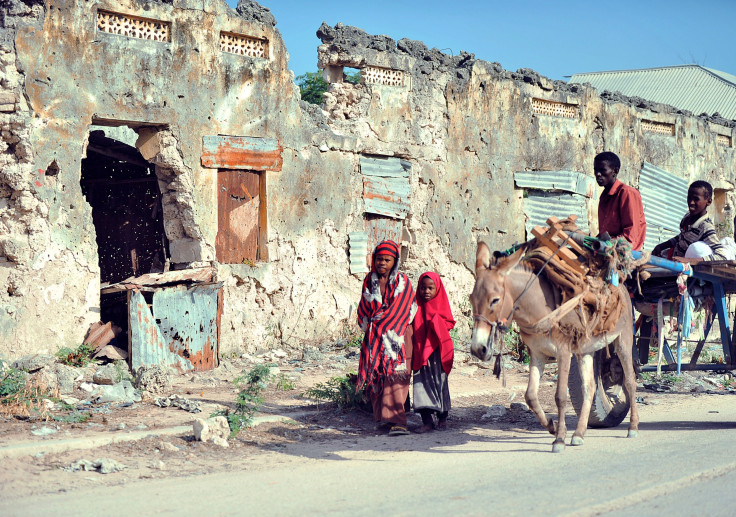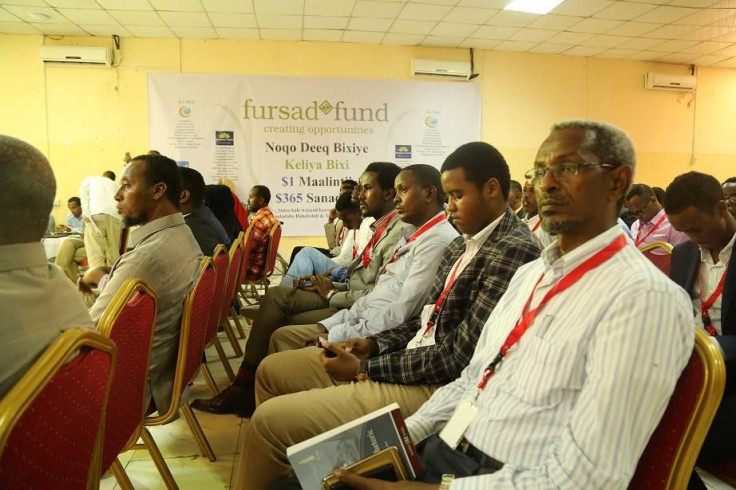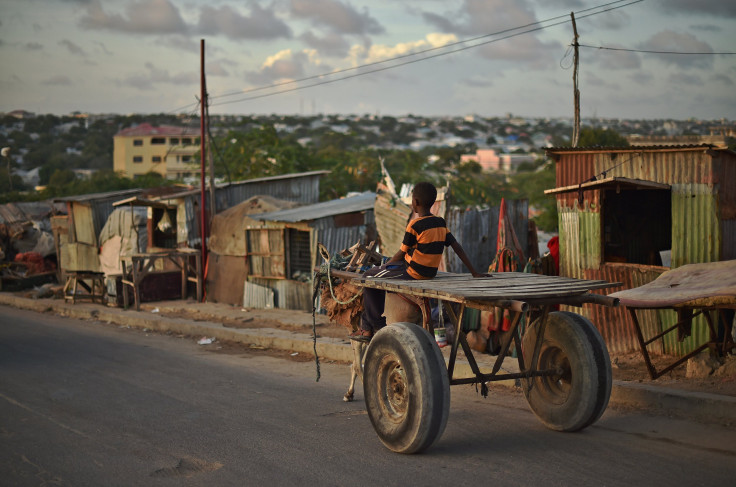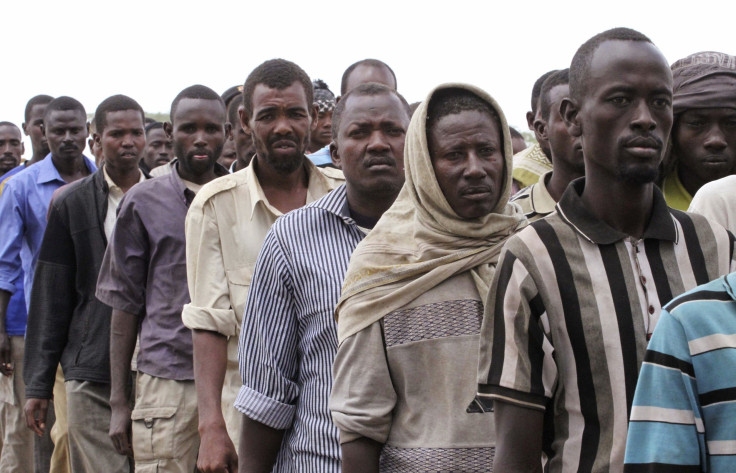Somalia’s First Independent Trust Fund Offers Hope To Unemployed Youth, Raises Concerns Of Corruption

Nadir Sharif Maqbul loves to play soccer and has dreams of one day joining the Chelsea Football Club in London. But his reality is less bright in Somalia, where the majority of the country’s youth are unemployed. Maqbul is one of them. The 20-year-old, who has failed to find a full-time job for the past several years, needs a steady income to support his widowed mother and marry his girlfriend.
“No job opportunities exist in this country,” said Maqbul, who lives and attends secondary school in the capital, Mogadishu.
That could all change with Fursad Fund, which launched last weekend and aims to establish “Somalia’s first independent trust fund” through donations from citizens and the Somali diaspora, rather than foreign aid. The money raised is meant to help create jobs and other opportunities for impoverished and disadvantaged communities across the East African country, where youth are often otherwise lured by piracy or armed groups.
But while residents and the government hailed the homegrown campaign’s intentions, Somalia analysts were concerned about Fursad Fund's board of directors and its links to the government. They also warned that success will ultimately be determined by the organization's ability to deliver on its lofty promises and remain transparent in a country that has been dubbed the world’s most corrupt.
“It’s going to face the predictable challenges in a place like Somalia,” said Ken Menkhaus, a political scientist at North Carolina’s Davidson College who focuses on the Horn of Africa. “Any trust or foundation like this does run the risk of abuse if there isn’t very good governance or oversight. That falls on the shoulders of the board of directors in a country which routinely ranks No. 1 of corrupt cultures on Earth.”
Fursad Fund is targeting 5,000 Somali donors for the first year, with each one paying $1 per day, $7 per week, $30 per month, $365 per year. That will total $1.825 million in donations, and the finances will be allocated to the fund’s “three core joint targets,” as determined solely by a board of directors. These priorities will address issues nationwide in Somalia’s past, present and future: social reconciliation and trust-building encouragement, job creation and poverty reduction as well as education and infrastructure development.
It also sets out to recruit a thousand volunteers from across the country to support the implementation of proposed projects, which include a vocational training program, community infrastructure development, a teacher training program and a capacity and salary support program for various industries in both the public and private sectors.
“This is not only about money. This is about mobilizing the Somali people,” said Abdi Barud, the interim campaign manager for Fursad Fund and the executive director of Global Somali Diaspora, a nonprofit headquartered in Minneapolis and London. “It’s about encouraging and convincing Somali people of the importance of self-sufficiency, self-reliance.”
Barud said Fursad Fund is specifically pursuing donations from Somali residents and expats. Money from foreign aid organizations, such as the United Nations, will be rejected.
“We will not accept foreign aid. Why? Because the whole concept is based on ‘we can do it for ourselves’ and that defeats the purpose,” he said in a telephone interview Tuesday from Mogadishu. “Foreign aid can help but it cannot solve all your problems. Unemployment remains really high, so we’re developing our own initiative.”

Fursad Fund made its official debut at a launch party held Saturday in Mogadishu. Dozens of young people attended the event and were eager to learn more about the organization’s plans to empower youth in a country where 73 percent of the people live on less than $2 a day.
“It’s really historical to me,” said Abdel Alas, a 20-year-old Mogadishu resident. “It’s Somali-owned, Somali-led. I’m sure many Somalis like me will definitely support this.”
Sagal Bihi, a 32-year-old Mogadishu resident, shared a similar sentiment. “I’m one of the youth who grew up and got educated in the city. I’ve been very excited about this campaign,” she said. “It’s a revolution. It’s something we really want: Somali people to own their decisions, to own their future, to tell them they can be their own donors.”
The unemployment rate for youth in Somalia is one of the highest in the world. Overall youth unemployment stands at 67 percent, according to the U.N. Development Program, but that number is higher for woman and in certain areas of the country. Somalia also has one of the lowest rates of school enrollment, with more than 80 percent of primary-age children no longer in school or have never attended. These issues verge on catastrophic considering that over 70 percent of Somalia’s 10.5 million population is under 35.
Key question are: Can this initiative be replicated countrywide? How sustainable? Can it stop youth from blowing themselves up? @FursadFund
— Harun Maruf (@HarunMaruf) February 27, 2016
With little to no opportunities at home, many young Somalis want to leave the country and hundreds have died each year risking their lives crossing the Mediterranean Sea in search of jobs in Europe. Others are fleeing due to the lack of security and the risks posed by Islamic militant group al-Shabab. Official Italian statistics show that Somali children were the fourth and sixth largest national group of unaccompanied children who reached Italy by sea in 2014 and 2015, respectively.
When fleeing is not an option, many young Somalis have turned to piracy or joining militias as a solution. One armed pirate can earn between $6,000 and $10,000 for a $1 million ransom, according to a 2008 report commissioned by the United Nations. Militant groups like al-Shabab also make alluring promises of income from their illicit dealings.

Civil war has ravaged Somalia for decades, with many buildings still bullet-ridden and crumbling. Clan warlords have battled for power in the country since the collapse of a military dictator’s regime in the early 1990s. After years of interim authority, a federal government headed by the president and parliament was established in 2012. But Somalia’s internationally recognized government has failed to assert central authority over the nation. An estimated 1.1 million Somalis -- approximately a tenth of the population -- are internally displaced, according to the Internal Displacement Monitoring Center in Geneva. The lack of national authority, coupled with Somalia’s high unemployment, has created a niche for piracy and armed groups.
Large swathes of south-central Somalia are controlled by al-Shabab, where it has imposed a strict version of Sharia law. The al Qaeda-aligned group emerged in 2006 from the now-defunct Islamic Courts Union that controlled Mogadishu. Al-Shabab launched its own insurgency on major Somali cities like Mogadishu by 2009 before being pushed out by local and international forces around 2012. However, the Somalia-based terror group has increased efforts in recent years to oust the Western-backed government, and its militants regularly target government officials and civilians in bustling, public areas like marketplaces, restaurants and hotels.
The notion of an independent trust fund, entirely funded and managed by Somalis, sounds like an unwavering means to help heal Somalia’s war wounds and invest in its future: its youth. But there are concerns the organization’s good intentions will sour amid Somalia’s insufficient monitoring of efficacy among nongovernmental organizations, or NGOs.
Fursad Fund has vowed to be transparent about its finances and has so far kept the public updated on who is donating and how much. The fund is the first of its kind in Somalia, so there is no precedent. However, corruption has long characterized the country’s economy and leadership. Somalia and North Korea tied for the title of the world’s most corrupt country, according to the 2015 Corruption Perceptions Index released in late January by anti-graft nonprofit Transparency International. Somalia has been awarded this title consistently for the past several years.
Moreover, confidential U.N. reports obtained by Fox News in January last year revealed that three organizations claiming to do vital relief work on behalf of the United Nations in Somalia had diverted millions of dollars intended for much-needed food, water, medicine and other aid in the country. In one case, U.N. investigators noted evidence that “suggested possible payment of projected funds to a terrorist group.”

Although Fursad Fund is technically independent from the government, its founder and one of its board members, Abdirahman Aynte, is the minister of planning and international cooperation. At least four other board members also have ties to the federal government or the previous transitional authority. Somalia analysts said all 11 of the board members are considered highly respected and trusted within their communities, but there is still a heightened risk of corruption considering the board of directors – the sole authority over the trust fund – includes several government-linked individuals.
A 2013 report by the U.N. Monitoring Group on Somalia showed that the installation of formal government a year earlier did little to change a crooked system. The report, obtained by the Wall Street Journal, said Somalia’s central bank became a “slush fund” for patronage networks with some 80 percent of withdrawals made for private purposes rather than running the government.
“It does concern me because government people are on there and government people have their agenda,” said Peter Little, the director for Emory University’s Center for Development Studies in Atlanta whose research has focused on East Africa. “The key to this is going to be transparency and whether they have anything to deliver. Right now, it’s just three general ideas.”
Barud, the interim campaign manager for Fursad Fund, acknowledged the concerns but said the trust fund will prove its complete transparency and accountability in the coming months.
“We were expecting this,” he said. “I don’t expect people to trust at this moment. The next three months will be crucial. I have no doubt if we can get the work done, we can prove people wrong.”
Money so far received, please support @FursadFund
— Fursad Fund (@FursadFund) February 29, 2016
we will keep you update iA pic.twitter.com/tqbqKxirP2
Fursad Fund has the opportunity to build trust between the Somali people and government officials. But with so much excitement surrounding Fursad Fund and its plans for creating opportunities, it also runs the risk of letting down thousands of youth who are desperate for jobs.
“It is a new organization and time will tell how good and effective it is,” said Abdi Samatar, a Somali scholar, writer and professor of geography, environment and society at the University of Minnesota in Minneapolis. “All will depend on the ability of the board of directors to engender trust, confidence and competence. These equalities are lacking in so many organizations.”
For Maqbul, Fursad Fund is his only hope. The young Mogadishu resident has repeatedly tried to leave Somalia in search of jobs abroad, but has been detained at the border.
“I need a job,” he said several times. “I believe this fund will give me an opportunity.”
Hussein Mohamed in Mogadishu contributed reporting for this story.
© Copyright IBTimes 2024. All rights reserved.





















